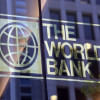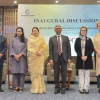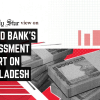New chapter in partnership with World Bank

It is encouraging to see the beginning of a new chapter in the partnership between Bangladesh and the World Bank through the signing of a fresh set of loan agreements to finance a range of new projects. The deals come on the occasion of Prime Minister Sheikh Hasina's official visit to the US to join the celebrations of 50 years of relations between the two development partners. The World Bank has approved a total of $2.75 billion of loans to fund six projects in Bangladesh over the next five years, of which five deals worth $2.25 billion were signed on May 1. We are also pleased to see that the funds are all aimed at facilitating sustainable and resilient development in the country.
The World Bank is one of the earliest and most prominent actors in Bangladesh's development journey so far. The country has the largest ongoing programme of the lender's International Development Association (IDA). It has had a significant contribution to the country's impressive growth over the past five decades. Currently, the World Bank is committed to 53 different projects in Bangladesh, involving $15 billion. So, it is only natural that this partnership should continue as Bangladesh progresses towards becoming an upper-middle-income country by 2031 and a high-income country by 2041.
And why should this partnership not grow further? Bangladesh has an impeccable track record in repaying loans – sometimes ahead of the stipulated deadlines. The country's impressive achievements in poverty reduction, income growth, primary education, tackling climate change impacts, disaster management, etc should be reassuring enough that the World Bank can continue supporting its developmental goals. We are glad to note that both the government and the multilateral lender have moved past the conflict over the Padma Bridge, when the World Bank scrapped its offer of $1.2 billion loan for the project in 2012 on corruption allegations.
It is not only this debacle that roughened up the relationship between Bangladesh and the World Bank. There has been growing dissatisfaction over the years that the lender has seemingly been rigid in its negotiations with low-income countries like Bangladesh, with a "take it or leave it" attitude and little interest in listening to and learning from the countries' knowledge and experiences. This sort of attitude has sometimes proven to bring more harm than good, according to economic experts. However, in recent years, there has been a substantial change in how the World Bank deals with countries like Bangladesh, and we hope that, moving forward, the relationship will be one of mutual respect and collaboration.
As Bangladesh prepares to officially become a developing country in 2026, it is time for both the parties to move forward with a new resolve for better, more levelled collaborations that benefits the country in a sustainable way. And the government, keeping in mind the development goals it has set for the country for the next 20 years, should prepare plans and strategies to optimally utilise the funds, while ensuring that the very best interests of the country's people are served.


 For all latest news, follow The Daily Star's Google News channel.
For all latest news, follow The Daily Star's Google News channel. 









Comments